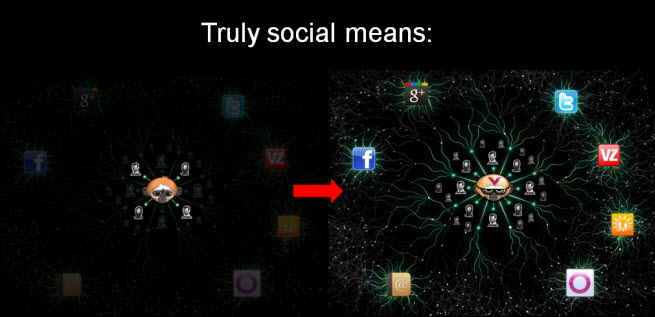 Viximo, a platform for cross-platform social games, is broadening its distribution reach today with the launch of its Social Zone platform which helps make mobile apps more social.
Viximo, a platform for cross-platform social games, is broadening its distribution reach today with the launch of its Social Zone platform which helps make mobile apps more social.
The company is attacking the problem of discovery, which is more difficult on mobile platforms than it is on social networks. Mobile app makers have a hard time getting noticed on platforms with hundreds of thousands of rival apps. By making the mobile apps more social, Viximo hopes to help the apps spread more easily by word of mouth.
Dale Strang, chief executive of Viximo in San Francisco, said in an interview that his company has already made it easier to spread games through the company’s collection of social networks. Viximo publishes social games across dozens of networks with more than 200 million users around the world. Now, with the mobile-focused Social Zone, Viximo will enable developers to publish games to Android and iOS (iPhone, iPad, iPod Touch) devices.
“It’s adding purely social featurs to mobile gaming,” Strang said.
The hope is to amplify the virality of mobile apps; enable players to find, collaborate and compete with friends in real-time; and discover relevant games based on what their friends are playing. With Social Zone, developers can accelerate user acquisition, increase engagement, and drive monetization. The system is in beta and it will be released formally in a couple of weeks, Strang said.
Strang said that, in contrast to rivals such as Gree and DeNA/Ngmoco, Viximo will not put its branding on the social platform. Rather, it will allow the developers and publishers to put their own brands on it and also retain their direct relationship with the players.
“The other networks were made for downloadable games,” said Strang. “Ours is made for the freemium world. They have leaderboards and achievements. They’re monolithic platforms. Ours is designed to be purely social. You can add more features and customize it. The options for social mechanics are in the hands of developers.”
He added, “We aren’t trying to build a Mobage network where we own the brand experience. We’re taking years of experience in social games and applying it to a mobile opportunity.”
Social Zone lets publishers publish games to multiple channels and send messages across those channels. It can create a real-time presence solution and cross-promote games across the whole network. Developers using it should be able to attract more players, make their games more social, and drive higher revenue, without letting someone else get between their brand and the customer.
Within the offering is something that Viximo calls the Social Supergraph (illustrated at top), which presents a unified social graph for a user from multiple social networks and mobile platforms, including the user’s own address book, Facebook, Twitter, and the numerous regional social networks that Viximo works with today. Those include Google+, Yahoo Games, Tuenti, VZnet, Gaia Online, Orkut, IMVU, Odnoklassniki, and Nasza Klasa. Viximo will still expand its social games presence on social networks; the mobile expansion will be on top of that.
Social Zone runs under the surface and integrates seamlessly with a game, rather than operating as a branded channel above the game, as with DeNA’s Mobage. It enables freemium games to be customized for various social options. Social Zone uses Viximo’s own real-time analytics to give developers insights into game usage.
Social Zone gives developers an open applications programming interface that enables developers to seamlessly integrate social graph support into their app and customize the social graph with app-specific data. Viximo says it will protect user privacy and use their data only with permission. The company is signing new partners for Social Zone now.
“We want to get the features out there and then release the developers,” Strang said.
User acquisition is one of the big topics at our upcoming VentureBeat Mobile Summit.
VentureBeat is holding its second annual Mobile Summit this April 2-3 in Sausalito, Calif. The invitation-only event will debate the five key business and technology challenges facing the mobile industry today, and participants — 180 mobile executives, investors, and policymakers — will develop concrete, actionable solutions that will shape the future of the mobile industry. You can find out more at our Mobile Summit site.



